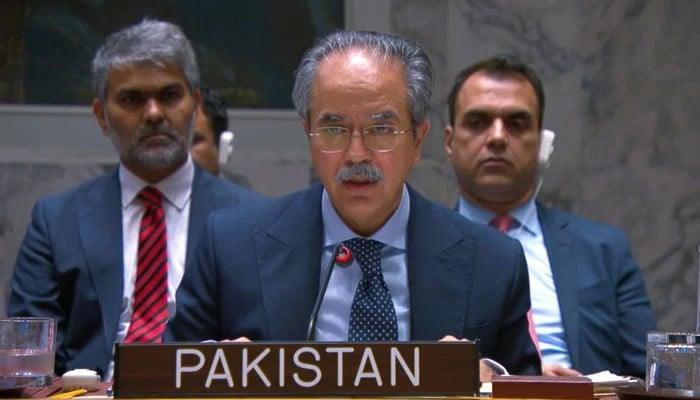Israel’s strikes on Iranian nuclear and military facilities have been described as a “serious danger and serious threat” for peace, security and stability from the whole region and beyond, Pakistan told the United Nations Security Council during an emergency session convened on Friday.
The council of 15 members has adjusted its initial schedule to combat the rapidly evolving crisis, hearing the head of the United Nations nuclear custody, which has warned of serious risks both to regional stability and nuclear security.
In his remarks, the Ambassador Asim Iftikhar Ahmad, the permanent representative of Pakistan to the UN, strongly condemned the “unjustified and illegitimate” aggression of Israel against Iran. He reaffirmed that Pakistan was in solidarity resolved with the Iranian government and the people.
The Iranian Minister of Foreign Affairs, Abbas Araghchi, had asked for the meeting of the Security Council, declaring that Israel had “now crossed all the red lines”, urging the international community to ensure that these crimes were not unpunished.
Among those who support the request for a meeting were Pakistan, China and Russia.
Faced with the climbing of tensions, Ambassador Ahmad urged the Security Council to maintain its responsibility to apply international law and to stop the assault immediately. He strongly called for the resolution of the crisis by dialogue and diplomacy.
During the meeting, Rosemary Dicarlo, the United Nations Under-Secretary General for Political Affairs, informed the Council of Répercussions of Attacks, which were already felt in the region.
“I reaffirm the condemnation by the secretary general of any military climbing in the Middle East,” she said, urging both Israel and Iran to exercise a maximum restriction and to avoid, “at all costs, a descent into a deeper and broader regional conflict.”
She also pointed out that military climbing had occurred when “certain important diplomatic developments” took place, in particular the planned resumption of the American-Iranian talks to Oman, that Iran has now indicated that it would no longer assist.
Dicarlo has urged all parties to remain involved in diplomacy, declaring: “A peaceful resolution through negotiations remains the best way to ensure the peaceful nature of the Iranian nuclear program.”
She added: “We must avoid, at all costs, a growing conflagration which could have enormous global consequences.”
Rafael Grossi, Director General of the International Atomic Energy Agency (IAEA), also informed the Council, claiming that his agency was in constant contact with the Nuclear Regulatory Authority of Iran to assess the status of affected installations and determine the wider impacts on nuclear safety and security.
He stressed that nuclear sites should never be targeted in any case. “Such attacks have serious implications for nuclear security, security and guarantees, as well as for regional and international peace and security,” said Grosi.
He added that he was ready to go to the region as soon as possible to assess the situation and support the efforts of security, security and non-proliferation in Iran.
“It is clear that the only sustainable path to follow for Iran, Israel, the whole region and the international community is based on dialogue and diplomacy to ensure peace, stability and cooperation,” concluded gross.
He also offered the IAEA as a neutral platform, where “the facts prevail over rhetoric” and where technical commitment can replace climbing. “I reaffirm both my personal commitment and the agency’s desire to facilitate dialogue and support efforts that promote transparency, security and peaceful resolution of nuclear problems in Iran.”




